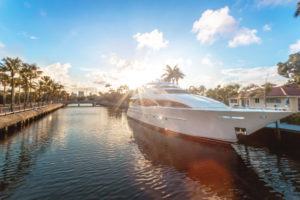It’s true that most states do not require you to carry Boat Insurance. However, your boat is a valuable asset, much like your car or recreational vehicle. So, why wouldn’t you want to protect it with insurance? Think about what would happen if your boat hits another watercraft, is vandalized in storage or gets stolen. Without Boat Insurance, you’d end up paying hundreds or even thousands of dollars out of your pocket for those losses.
Boat Insurance Facts
If you lease or finance your boat, then your lender probably requires you to carry Boat Insurance. However, even if your watercraft is paid off, it’s still susceptible to the damages we’ve mentioned above. Do you still believe that a boating accident won’t ever happen to you? Check out the facts below and you might change your mind.
 According to the U.S. Coast Guard, there were over 4,000 boating accidents in the U.S. in 2017. Over half of them incurred property damage or injuries.
According to the U.S. Coast Guard, there were over 4,000 boating accidents in the U.S. in 2017. Over half of them incurred property damage or injuries.- Over 1,000 of those accidents were caused by a collision with another recreational vehicle. The total cost of those damages was over $46 million.
- According to the National Insurance Crime Bureau, the most frequently stolen boat types in 2017 were runabouts, utility boats, cruisers and sailboats.
- Boat theft occurred most often in Florida, and the holiday with the most watercraft thefts in 2017 was Memorial Day.
You should also be aware that your Homeowners Insurance most likely does not cover your boat. Your Homeowners policy may only include your boat if it is small in size and has no engine or a small one (like a sailboat). Your Homeowners Insurance may provide some coverage if your boat is damaged while parked on your property, but not for vandalism or stolen contents. It’s best to think of your boat as unique and requiring its own policy, just like your car.
What Does Boat Insurance Cover?
Hopefully, you’re beginning to see why Boat Insurance is essential coverage to have. At this point, you might be wondering how Boat Insurance works and what it covers. Similar to Auto Insurance, a Boat Insurance policy typically covers you for Bodily Injury Liability and Property Damage Liability. Your policy may also include Collision and Comprehensive coverage.
 Liability Insurance. Covers injuries or damages caused by your boat in an accident, up to your policy limits. For example, if your boat inflicts damage on a dock or other watercraft, your coverage will pay for those damages.
Liability Insurance. Covers injuries or damages caused by your boat in an accident, up to your policy limits. For example, if your boat inflicts damage on a dock or other watercraft, your coverage will pay for those damages.- Collision Coverage. Pays for the repair or replacement of your boat in the event of a collision, up to your policy limits.
- Comprehensive Coverage. Covers your boat if it is stolen, vandalized or damaged in an accident other than a collision.
You should also keep in mind that insuring one type of boat, like a sailboat, is different from insuring a boat like a trawler. So, make sure you have the correct coverage for your watercraft. You don’t want to buy a yacht policy if you own a runabout.
Boat Insurance Navigational Limits
 It’s important to realize that a Boat Insurance policy has navigational limits. Typically, your policy will include a navigational warranty that varies depending on the size of your watercraft. For example, coverage for boats that are 26-feet long or shorter may be limited to the inland or coastal waters of the U.S. and Canada. If your vessel is larger, check with your carrier to see where you’re covered. To ensure you have coverage in the areas you plan to travel, have an idea of where you want to go boating when you purchase your policy. Some insurers may have the ability to provide you with insurance for a one-time trip, but always speak with your agent before sailing off.
It’s important to realize that a Boat Insurance policy has navigational limits. Typically, your policy will include a navigational warranty that varies depending on the size of your watercraft. For example, coverage for boats that are 26-feet long or shorter may be limited to the inland or coastal waters of the U.S. and Canada. If your vessel is larger, check with your carrier to see where you’re covered. To ensure you have coverage in the areas you plan to travel, have an idea of where you want to go boating when you purchase your policy. Some insurers may have the ability to provide you with insurance for a one-time trip, but always speak with your agent before sailing off.
Additional Boat Insurance Coverages
As with most other types of insurance, there are optional coverages you can add to your policy for extra financial protection. To find out what coverages best fit your lifestyle and boat type, speak with your agent. With the right policy, you can worry less and enjoy your boat more.
Coverages you can add to your Boat Insurance policy include:
- Total Loss Replacement. Replaces your boat with the latest model, or a comparable one, if it is deemed a total loss.
 Uninsured Boaters Coverage. Covers medical treatment, wage loss and other damages sustained as a result of a boating accident in the case that the liable boater does not have enough or any Liability coverage.
Uninsured Boaters Coverage. Covers medical treatment, wage loss and other damages sustained as a result of a boating accident in the case that the liable boater does not have enough or any Liability coverage.- Actual Cash Value. Provides compensation for your totaled vessel, determined by market value and condition of the insured boat at the time of the loss.
- Disappearing Deductible. Reduces your Comprehensive and Collision deductibles for each claim-free renewal period up to 25%.
- On-Water Towing & Labor. Reimburses you for costs incurred in the event that your vessel is towed.
- Agreed Value Coverage. Compensates you for the amount initially paid to buy your insured boat. No deduction for depreciation and no deductibles are applied.
Coverage When You’re Towing Your Boat
 A standard Boat Insurance policy typically covers physical damage to your boat whether it’s being hauled on land or while it’s on the water. However, it won’t provide coverage if you’re found at fault for damages that occur to another vehicle or person while you’re towing your boat. In that case, your Auto Insurance policy’s Liability Insurance covers those types of damages.
A standard Boat Insurance policy typically covers physical damage to your boat whether it’s being hauled on land or while it’s on the water. However, it won’t provide coverage if you’re found at fault for damages that occur to another vehicle or person while you’re towing your boat. In that case, your Auto Insurance policy’s Liability Insurance covers those types of damages.
It’s best to speak with your agent about how your Boat Insurance and Auto Insurance work to cover your boat while it’s on land. You may need to purchase separate coverage specifically for trailers and other boat accessories to protect those assets in the event of an accident. You can call an Insurance Specialist at (855) 919-4247 to discuss your coverage options.
What Determines My Boat Insurance Rate?
The average cost of Boat Insurance is $300-500 per year, according to Trusted Choice. That’s only about $25-42 per month, which is not a lot extra to pay for better peace of mind.
Factors that may determine your Boat Insurance rate include:
- Boat Type
- Boat Year, Make and Model
- Driving Record
 Boating Experience
Boating Experience- Boat Length
- Where You Use Your Boat
- Boat Value
- Boat Usage
- Age of Boat
- Boat Speed/Horsepower
- Where You Store Your Boat
Seasonal Boat Insurance
As with other recreational vehicles, some insurance companies offer seasonal Boat Insurance options. If you only use your watercraft for a couple months out of the year, then you may consider a seasonal policy. However, year-round Boat Insurance covers your watercraft while it’s in storage, which is just as important. That’s because even in storage, your boat is vulnerable to damage from natural disasters, fire, flooding, theft and more. Additionally, if you live in a hurricane-prone area like Florida, then year-round Boat Insurance is worth the investment.
How To Save Money On Boat Insurance
 Once you understand the benefits of Boat Insurance, it’s easy to see why a policy is worth it. There are also many ways to find a policy that won’t cost you an arm and a leg. Shopping around for rates is the best way to save money on insurance.
Once you understand the benefits of Boat Insurance, it’s easy to see why a policy is worth it. There are also many ways to find a policy that won’t cost you an arm and a leg. Shopping around for rates is the best way to save money on insurance.
Many insurance companies also offer Boat Insurance discounts that help lower your premium. Discounts you may qualify for are a Multi-Policy discount, a Boater Safety Course discount, an Auto-Pay discount and more. Speak with one of our Insurance Specialists to see if there are any discounts you’re eligible for. They will also compare multiple carriers to find you the lowest rate in minutes. Boat Insurance may just be more affordable than you think when you call (855) 919-4247.
The information in this article is obtained from various sources. This content is offered for educational purposes only and does not represent contractual agreements. It should not replace manuals or instructions or the advice of a qualified professional. The definitions, terms and coverage in a given policy may be different than those suggested here. Such policy will be governed by the language contained therein, and no warranty or appropriateness for a specific purpose is expressed or implied.

